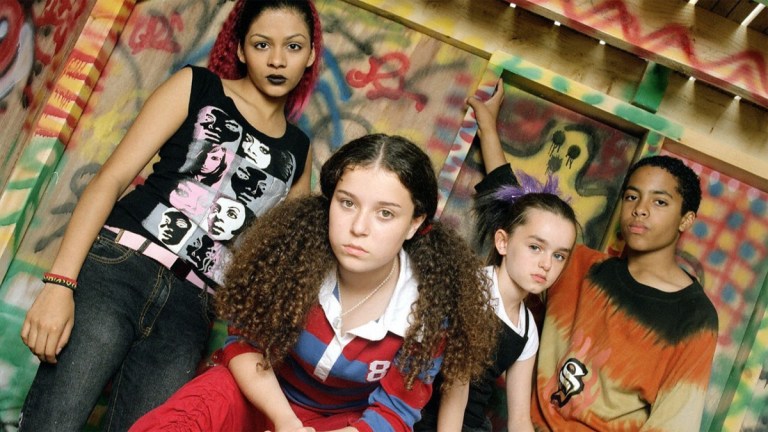The Story of Tracy Beaker Was Euphoria For Early 2000s Brits
Just like the messy teen drama, Tracy Beaker always had something to say.

Sometimes, telly’s only job is to make us feel better about ourselves. We tune into things to tune out of others, and root for someone that has it worse off. Watching Euphoria’s Rue space out or Cassie dress up as an extra from Oklahoma! is now TV’s messy binge-watch of choice. For early 2000s Brits, the obsession started with CBBC’s The Story of Tracy Beaker.
At its core, the premise was simple. Swap out a high school filled with curious and complicated characters for a foster care home called the Dumping Ground, sit back, and let the rest take care of itself. Ten-year-old Tracy (Dani Harmer) is sent back into temporary care after a failed adoption placement and is often told she has behavioural problems. Alongside a fresh crop of clueless social workers, Tracy lives with a motley crew of mischievous pranksters, including her arch nemesis Justine Littlewood. Based on the book by Jacqueline Wilson, The Story of Tracy Beaker was 15 minutes of pre-pubescent chaos. Just switch the cocaine for Capri-Suns.
While telling every adult in a 20-mile radius to “bog off,” Tracy Beaker was a marvel. British kids might have been used to talking cars and well-behaved dogs flying in planes, but a misunderstood child seemed like a step too far. Now, the same generation thinks nothing of Kat working as a camgirl or Rue leaving rehab to immediately score. But eating worms, food fights, and leaving your social worker in the Science Museum felt like a new televised frontier. Tracy told it as it was — if something wasn’t fair, it would be called out. If she didn’t want something, it wouldn’t be done. And if someone had wronged her, there would be all hell to pay.
Unlike the pretence of the Instagram-addled Euphoria, a big part of The Story of Tracy Beaker merely allowed kids to be kids. Kicks and thrills came from the things we’d genuinely be concerned with. The nation’s little ones became hooked on who stole Rio’s Maroon 5 CD, Justine and Louise’s endless dance routines, and desperately wanted to join Amber’s ‘too cool for school’ gang. If there was a child to be represented, they were there — often throwing flour over anyone above 30. Even the one bizarre musical number that didn’t quite work gave us lots to laugh about.
Where Rue is the cause of domestic drama, Tracy and co. had it thrust upon them. What took The Story of Tracy Beaker from children’s TV and booted it into the realm of teen travesty was the topics that hit it like a freight train. Sandwiched in between programmes like Dick & Dom In Da Bungalow and Mona the Vampire, the Dumping Ground was packed with adult issues. Aside from it being hinted that Tracy had been abused at her last housing placement, each of the kids took their grown-up problems on the chin. From Jackie being left to care for her dementia-ridden grandad to Crash and his brewing anger issues, drama was dished out in a way only Jacqueline Wilson knows how. The show may have been the first time TV had treated us as adults. Instead of trying to sugar-coat the bad times with a lolly and surprise sleepover, kids got to sit in their feelings and work things through. That’s not to say they didn’t have to deal with their own consequences — in one Series 5 episode, the kids become social workers and vice versa. Talk about a school of hard knocks.
What made The Story of Tracy Beaker stand out so much was its ensemble. It was probably the first time many of us had ever heard of foster care, let alone seen something outside of our cushy living rooms. Even if we didn’t need to play nice with a social worker, we all had an adult we wanted to scream at. We all had a kid that was picking on us, a penchant to steal an adult’s make-up or dye our hair green when no one was looking. As the the Dumping Ground and its residents grew and eventually morphed into Tracy Beaker Returns, that confidence never went away.
Even though after-school viewing snacks of lunchables and squash changed to a glass of wine and Deliveroo, the spirit of The Story of Tracy Beaker never left the early 2000s Brits. Much like Euphoria for Gen Z, its impact lives on in memes, quotes, and iconic characters. The honesty of the show was the first of its kind, proving kids could have fun through the hard times. Maybe it was revolutionary. Maybe we just love mess. Regardless, Tracy Beaker was the poster girl of a generation in a world that just needed to bog off.
